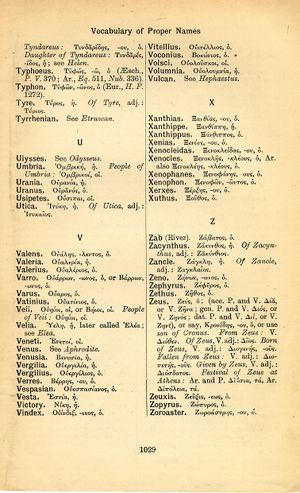Varro: Difference between revisions
Πολλῶν ὁ καιρὸς γίγνεται διδάσκαλος → Rebus magistra plurimis occasio → Zum Lehrer wird für viele die Gelegenheit
(6_17) |
(D_9) |
||
| Line 4: | Line 4: | ||
{{Lewis | {{Lewis | ||
|lshtext=<b>Varro</b>: ōnis, m.,<br /><b>I</b> a [[surname]] in the [[gens]] Terentia, e. g.<br /><b>I</b> M. [[Terentius]] [[Varro]], a [[contemporary]] of [[Cicero]], [[who]] wrote De Re Rusticā and De Linguā Latinā.—<br /><b>II</b> The [[poet]] P. [[Terentius]] [[Varro]] [[Atacinus]], Hor. S. 1, 10, 46.—<br /><b>III</b> The [[consul]] C. [[Terentius]] [[Varro]], defeated at Cannœ, Liv. 22, 34, 2.—Hence, Varrōnĭānus, a, um, adj., of or belonging to a [[Varro]], Varronian: milites, i. e. of the [[consul]] C. [[Terentius]] [[Varro]], Liv. 23, 38, 9: ingenia, of M. [[Terentius]] [[Varro]], Fulg. Myth. 1 praef.: comoediae, the [[collection]] of the [[twenty]]-one [[genuine]] comedies of [[Plautus]], arranged by M. [[Terentius]] [[Varro]], Gell. 3, 3, 3. | |lshtext=<b>Varro</b>: ōnis, m.,<br /><b>I</b> a [[surname]] in the [[gens]] Terentia, e. g.<br /><b>I</b> M. [[Terentius]] [[Varro]], a [[contemporary]] of [[Cicero]], [[who]] wrote De Re Rusticā and De Linguā Latinā.—<br /><b>II</b> The [[poet]] P. [[Terentius]] [[Varro]] [[Atacinus]], Hor. S. 1, 10, 46.—<br /><b>III</b> The [[consul]] C. [[Terentius]] [[Varro]], defeated at Cannœ, Liv. 22, 34, 2.—Hence, Varrōnĭānus, a, um, adj., of or belonging to a [[Varro]], Varronian: milites, i. e. of the [[consul]] C. [[Terentius]] [[Varro]], Liv. 23, 38, 9: ingenia, of M. [[Terentius]] [[Varro]], Fulg. Myth. 1 praef.: comoediae, the [[collection]] of the [[twenty]]-one [[genuine]] comedies of [[Plautus]], arranged by M. [[Terentius]] [[Varro]], Gell. 3, 3, 3. | ||
}} | |||
{{Gaffiot | |||
|gf=<b>Varrō</b>,¹¹ ōnis, m., Varron, surnom dans la famille [[Terentia]] ; not<sup>t</sup> C. [[Terentius]] Varron, battu à Cannes par [[Hannibal]] : Liv. 22, 34, 2 || M. [[Terentius]] Varron, le polygraphe || P. [[Terentius]] [[Varro]] [[Atacinus]], Varron de l’[[Atax]], poète contemporain d’Auguste : Hor. S. 1, 10, 46 || <b>-nĭānus</b>, a, um, de Varron : Liv. 23, 38, 9 ; <b>Varrōniānæ</b>, ārum, f., les Varroniennes, vingt et une comédies de Plaute, citées par Varron : Gell. 3, 3, 3. | |||
}} | }} | ||
Revision as of 07:07, 14 August 2017
English > Greek (Woodhouse)
Οὐάρρων, -ωνος, ὁ, or Βάρρων, -ωνος, ὁ.
Latin > English (Lewis & Short)
Varro: ōnis, m.,
I a surname in the gens Terentia, e. g.
I M. Terentius Varro, a contemporary of Cicero, who wrote De Re Rusticā and De Linguā Latinā.—
II The poet P. Terentius Varro Atacinus, Hor. S. 1, 10, 46.—
III The consul C. Terentius Varro, defeated at Cannœ, Liv. 22, 34, 2.—Hence, Varrōnĭānus, a, um, adj., of or belonging to a Varro, Varronian: milites, i. e. of the consul C. Terentius Varro, Liv. 23, 38, 9: ingenia, of M. Terentius Varro, Fulg. Myth. 1 praef.: comoediae, the collection of the twenty-one genuine comedies of Plautus, arranged by M. Terentius Varro, Gell. 3, 3, 3.
Latin > French (Gaffiot 2016)
Varrō,¹¹ ōnis, m., Varron, surnom dans la famille Terentia ; nott C. Terentius Varron, battu à Cannes par Hannibal : Liv. 22, 34, 2 || M. Terentius Varron, le polygraphe || P. Terentius Varro Atacinus, Varron de l’Atax, poète contemporain d’Auguste : Hor. S. 1, 10, 46 || -nĭānus, a, um, de Varron : Liv. 23, 38, 9 ; Varrōniānæ, ārum, f., les Varroniennes, vingt et une comédies de Plaute, citées par Varron : Gell. 3, 3, 3.

